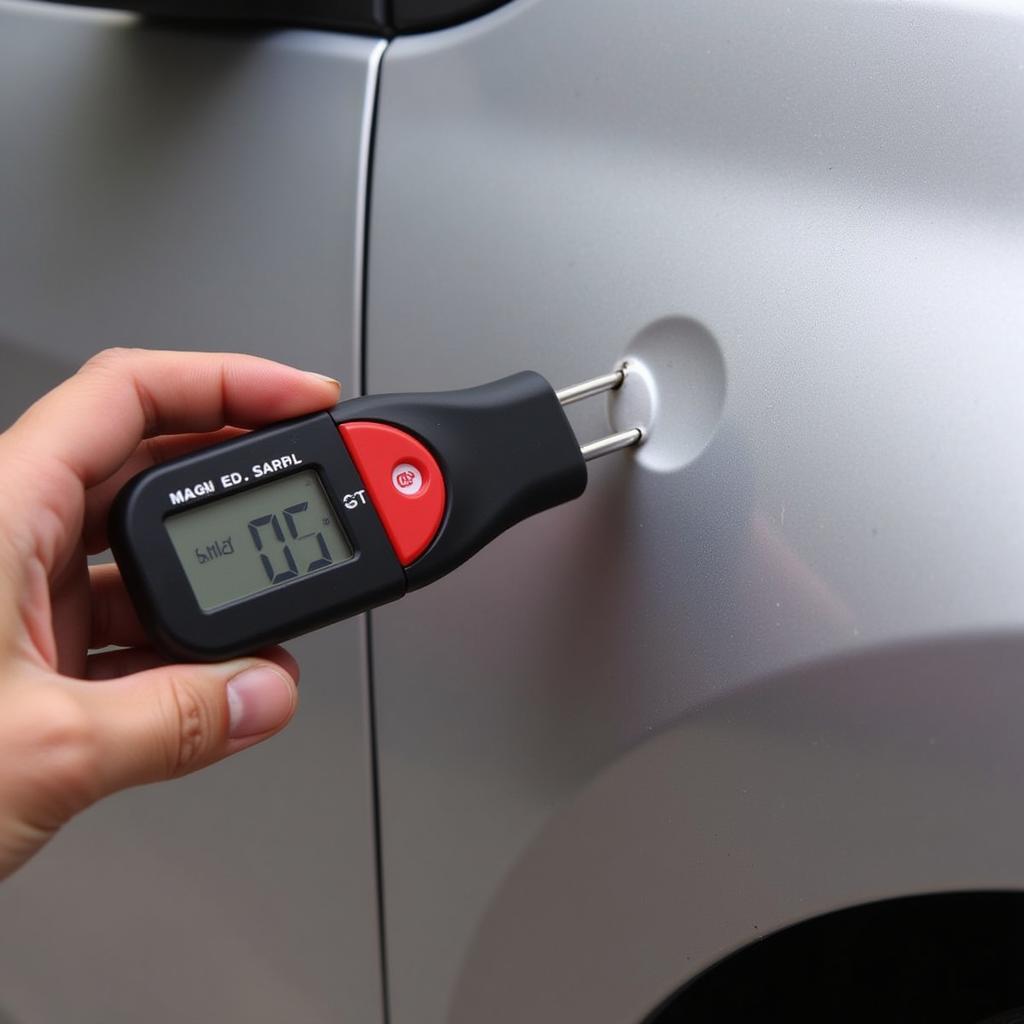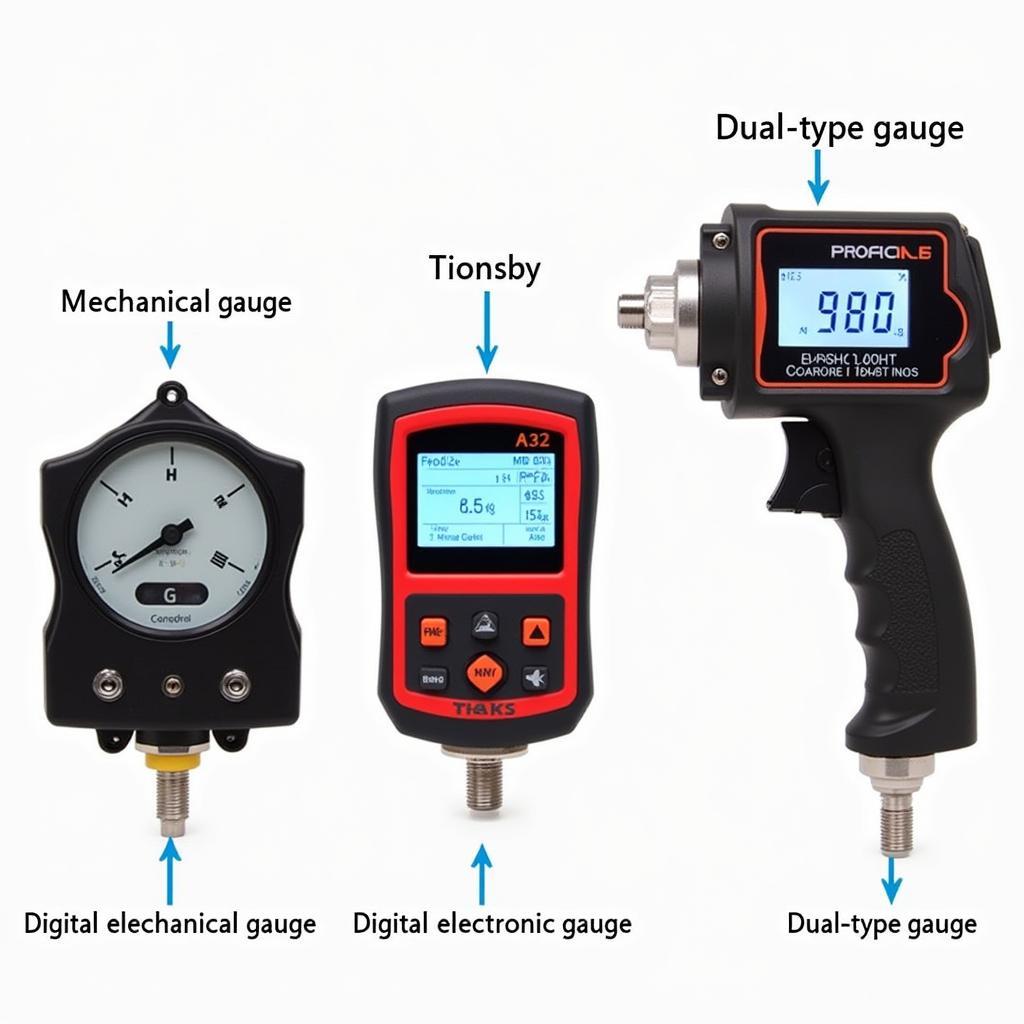A Car Paint Thickness Tool Magnetic Accurate is essential for anyone looking to assess the true condition of a vehicle’s paintwork. Whether you’re a professional detailer, a car enthusiast, or considering buying a used car, understanding how these tools work and which one is right for you can save you time, money, and potential headaches.
Understanding Car Paint Thickness Gauges
Car paint thickness gauges, often referred to as paint meters or mil gauges, are devices used to measure the thickness of a vehicle’s paint coating. This measurement helps determine whether a car has been repainted, whether body filler has been used (often to disguise accident damage), or if the original paint is simply wearing thin. Magnetic car paint thickness gauges are specifically designed for use on steel and iron surfaces, making them ideal for most vehicles. The accuracy of these tools is crucial for making informed decisions, whether you’re buying, selling, or restoring a car.
Why Accuracy Matters in Car Paint Measurement
The accuracy of a car paint thickness tool magnetic accurate is paramount. A small discrepancy in measurement can mean the difference between identifying a minor repair and missing significant hidden damage. Accurate readings provide invaluable insights into a car’s history, allowing buyers to negotiate a fair price or avoid purchasing a vehicle with undisclosed issues. For professionals, accurate measurements are essential for precise paint correction and restoration work.
 Magnetic Car Paint Thickness Gauge in Use on a Car Door
Magnetic Car Paint Thickness Gauge in Use on a Car Door
Types of Car Paint Thickness Tools Magnetic Accurate
There are several types of magnetic car paint thickness tools available, each with its own advantages and disadvantages:
- Mechanical Gauges: These are the simplest and most affordable option. They use a magnetic probe to measure the distance to the metal substrate. While they are generally less accurate than electronic gauges, they are still useful for basic assessments.
- Electronic Gauges: These gauges offer higher accuracy and often include features like automatic calibration and multiple measurement units (mils, microns, etc.). They are typically more expensive than mechanical gauges but provide a more precise reading.
- Dual-Type Gauges: These versatile tools combine both magnetic and eddy current measurement capabilities, allowing them to be used on both ferrous and non-ferrous metals (like aluminum). This makes them ideal for vehicles with a mix of metal types.
Choosing the Right Car Paint Thickness Tool
Selecting the right car paint thickness tool depends on your specific needs and budget. If you’re a casual user, a basic mechanical gauge might suffice. However, for professionals or those seeking the highest accuracy, an electronic or dual-type gauge is recommended.
 Various Car Paint Thickness Gauges – Mechanical, Electronic, and Dual-Type
Various Car Paint Thickness Gauges – Mechanical, Electronic, and Dual-Type
How to Use a Car Paint Thickness Tool Magnetic Accurate
Using a magnetic car paint thickness tool is relatively straightforward:
- Calibrate the gauge: Follow the manufacturer’s instructions to calibrate the gauge before each use. This ensures accurate readings.
- Clean the surface: Ensure the car’s surface is clean and free of any debris or contaminants.
- Place the gauge perpendicular to the surface: Hold the gauge at a 90-degree angle to the car’s surface for the most accurate reading.
- Take multiple readings: Take several readings in different areas to get a comprehensive understanding of the paint thickness.
Interpreting the Readings
Understanding the readings from a car paint thickness tool is crucial. Generally, a factory paint job on a car will have a thickness between 4 and 7 mils. Readings significantly higher than this may indicate repainting or the presence of body filler.
Conclusion
A car paint thickness tool magnetic accurate is an invaluable tool for anyone involved in the automotive industry or simply interested in assessing a vehicle’s condition. By understanding the different types of gauges available and how to use them correctly, you can make informed decisions and avoid costly mistakes. Investing in a quality car paint thickness gauge is an investment in your peace of mind.
FAQ
- What is a mil in car paint measurement? A mil is a unit of thickness equal to one-thousandth of an inch (0.001 inch or 25.4 micrometers).
- Why is it important to take multiple readings? Paint thickness can vary across different areas of a car, so taking multiple readings provides a more complete picture.
- Can I use a magnetic gauge on aluminum? No, magnetic gauges are designed for ferrous metals like steel and iron. For aluminum, you need an eddy current gauge or a dual-type gauge.
- How often should I calibrate my car paint thickness gauge? It’s recommended to calibrate your gauge before each use to ensure accuracy.
- What does a very high paint thickness reading indicate? A high reading often suggests repainting, the presence of body filler, or both.
- Where can I buy a car paint thickness gauge? Car paint thickness gauges can be purchased from automotive supply stores, online retailers, and specialty tool shops.
- What is the typical price range for car paint thickness gauges? Prices range from around $30 for basic mechanical gauges to several hundred dollars for professional-grade electronic or dual-type gauges.
“A reliable car paint thickness gauge is an essential tool in my kit,” says John Smith, Lead Auto Technician at Chicago Auto Experts. “It helps me identify potential problems that aren’t visible to the naked eye and ensures that I can provide accurate assessments to my clients.”
“When buying a used car, a paint thickness gauge is your best friend,” adds Maria Garcia, Automotive Consultant and Author of “The Smart Car Buyer’s Guide.” “It can save you from unknowingly purchasing a vehicle with hidden damage, giving you the power to negotiate a fair price or walk away from a bad deal.”
For support, contact us via WhatsApp: +1(641)206-8880, Email: [email protected] or visit us at 910 Cedar Lane, Chicago, IL 60605, USA. We have a 24/7 customer service team.

Leave a Reply